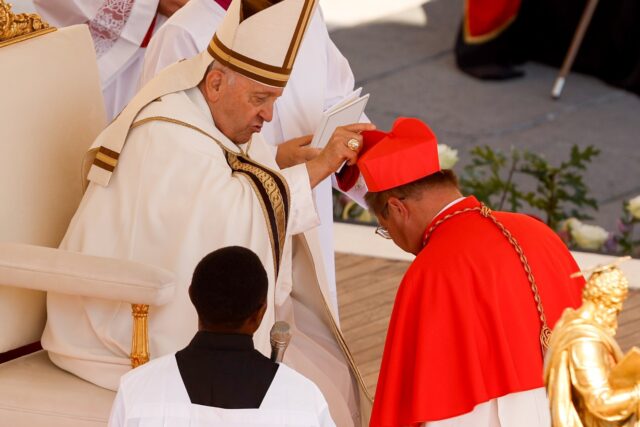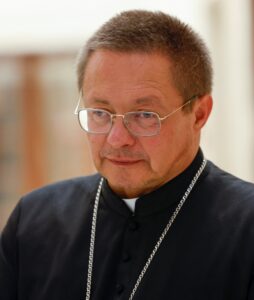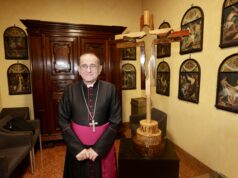
KRAKOW, Poland — As fall begins, Catholics are watching closely for Pope Leo XIV’s first major Vatican appointments. One of the most urgent vacancies to fill is his own former role — prefect of the Dicastery for Bishops.
Augustinian Father Alejandro Moral Antón, a longtime friend and former prior of the Augustinian order, told Il Messaggero in July that only after the summer break, the pope will make changes to the Vatican government — in other words, the Curia.
Before the May 8 election, Cardinal Robert Francis Prevost had been the prefect of the Dicastery for Bishops. On Sept. 12, OSV News sat down with Cardinal Grzegorz Rys of Lódz, who worked closely with Cardinal Prevost in the dicastery to discuss what kind of boss then-Cardinal Prevost was and how he likes to handle business — in anticipation of his own curial appointments.
Cardinal Rys said that in the Dicastery for Bishops, “the work is quite systematic.” Members — like the Polish cardinal — who don’t live at the Vatican, come every two weeks or on a monthly basis.
“At each meeting, candidates for four bishoprics somewhere in the church are considered,” the cardinal said, stressing that “this work needs to be prepared and distributed” and that then-Cardinal Prevost “handled it very efficiently.”
The efficiency was based on listening in leadership, the cardinal stressed.
“The work structure is such that he’s obligated to listen. I mean, yes, he chairs the meeting, but he’s the last one to speak. Which is good, because it allows him to hear the views of all the members who happened to be there for such a meeting.”
Cardinal Rys said the future pope “did it well,” “he did it with class” and with competence.
In the summer of 2022, Pope Francis appointed three women to the Vatican’s Dicastery for Bishops: Sister Raffaella Petrini, then-secretary general of the Governorate of the Vatican City State; Sister Yvonne Reungoat, former superior general of the Daughters of Mary Help of Christians; and Maria Lia Zervino, a layperson and president of the World Union of Catholic Women’s Organizations.
Cardinal Prevost as prefect “treated these women the same as any other member, clearly showing how much he values their voices,” Cardinal Rys stressed.
Referring to the pope’s organizational style, “it’s clear that he’s the kind of person who feels comfortable in the structure of such an organized work. I don’t get the impression that he’s someone who feels very comfortable when he needs to be spontaneous — he can certainly react immediately — but he prefers to have time, to give himself that time, not to act hastily, to seek opinions as widely as possible,” Cardinal Rys said.
“This is probably both good and bad. I mean, good in that it’s not thoughtless, but bad in that sometimes decisions might have needed to be made more quickly,” he pointed out.
Asked about no major appointments done to date, Cardinal Rys said that he’s “not surprised the Holy Father didn’t change” the current prefects yet.
“I think it’s very sensible to take the time to look at how they operate. He worked in the Curia for a while, probably less than three years, really. Three years is both a long time and a short time. It’s a long time to learn a little about how the Curia works, but it’s certainly not enough to learn all these units and understand their operations, to know the topics they cover, and they vary greatly,” he told OSV News.
“And it’s better to see how it works and functions. To develop your own convictions and views,” he added.
Cardinal Rys pointed out that in some ways the pope “is probably still the prefect” of the dicastery as the final say in the office’s decision “is passed to the Holy Father.”
“I think people have seen that the pope has been making episcopal appointments in various parts of the world,” even though the first fall plenary session of the dicastery was held on Sept. 18, the cardinal said.
Asked whether he could be the one who would replace Cardinal Prevost as the head of the dicastery, he said: “That requires very serious competencies, and I certainly don’t have them.”

Cardinal Rys stressed that there are many priorities on the desk of the pope, including world peace to which “he’s very committed.”
What is needed in this sphere, the cardinal said, is “a truly Christian narrative, because it’s not even found in the mouths of Christians.”
“This is a burning topic, which I also think everyone expects him to not limit himself to just some statements — that won’t be enough today.”
Cardinal Rys, who leads the Polish bishops’ Council for Religious Dialogue, said that “reviving ecumenical dialogue … can be an instrument of unity in the world” and is also a task for Pope Leo.
“What I know for sure is that we, the churches, must start speaking the Gospel” in a world as it is, the cardinal said.










